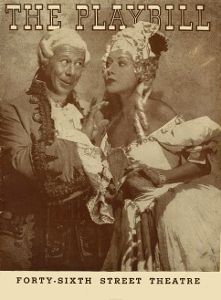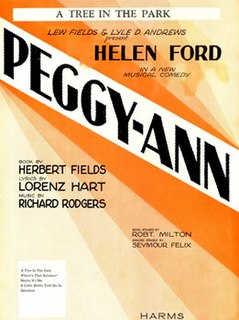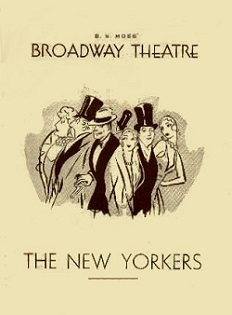
Cole Albert Porter was an American composer and songwriter. Many of his songs became standards noted for their witty, urbane lyrics, and many of his scores found success on Broadway and in film.

Fifty Million Frenchmen is a musical comedy with a book by Herbert Fields and music and lyrics by Cole Porter. It opened on Broadway in 1929 and was adapted for a film two years later. The title is a reference to the hit 1927 song "Fifty Million Frenchmen Can't Be Wrong" by Willie Raskin, Billy Rose, and Fred Fisher, which compared free attitudes in 1920s Paris with censorship and prohibition in the United States. The musical's plot is consistent with the standard boy-meets-girl plots of musical comedies of the first half of the twentieth century.

Panama Hattie is a 1940 American musical with music and lyrics by Cole Porter and book by Herbert Fields and B. G. DeSylva. It is also the title of a 1942 Metro-Goldwyn-Mayer musical film version based upon the play. The title is a play on words, referring to the popular Panama hat.
"Too Darn Hot" is a song written by Cole Porter for his musical Kiss Me, Kate (1948). In the stage version, it is sung at the start of Act 2, and in the 1948 original Broadway production, it was sung by Lorenzo Fuller and Eddie Sledge and Fred Davis, leading the full company. In the 1953 MGM Hollywood film version, it is moved to a much earlier point, and it is sung by Ann Miller. The song does not contribute to the plot in either the stage or film versions ; in the stage version, the song represents the company of The Taming of the Shrew taking a break offstage during the intermission of their play; in the film version it allowed the audience to see Lois's fun-loving, risk-taking nature, and gave Ann Miller a chance to show off her dancing skills, specifically tap. The line 'According to the Kinsey report' was changed in the film version to 'According to the latest report'. The song has also been covered by many artists.
"Love for Sale" is a song by Cole Porter introduced by Kathryn Crawford in the musical The New Yorkers, which opened on Broadway on December 8, 1930 and closed in May 1931 after 168 performances. The song is written from the viewpoint of a prostitute advertising "love for sale".

Du Barry Was a Lady is a Broadway musical, with music and lyrics by Cole Porter, and the book by Herbert Fields and Buddy DeSylva. The musical starred Bert Lahr, Ethel Merman and Betty Grable, and the song "Friendship" was one of the highlights. The musical was made into a 1943 Technicolor film Du Barry Was a Lady, starring Red Skelton, Lucille Ball, Gene Kelly and Tommy Dorsey and his orchestra.
"Lullaby of Broadway" is a popular song with music written by Harry Warren and lyrics by Al Dubin, published in 1935. The lyrics salute the nightlife of Broadway and its denizens, who "don't sleep tight until the dawn."
Paris is a musical with the book by Martin Brown, and music and lyrics by Cole Porter, as well as Walter Kollo and Louis Alter (music) and E. Ray Goetz and Roy Turk (lyrics). The musical, which premiered on Broadway in 1928, was Porter's first Broadway hit. The musical introduced the song "Let's Do It, Let's Fall in Love" sung by the show's star, Irene Bordoni. The story involves a young man from a very proper family in Newton, Massachusetts whose mother is horrified by his intention to wed a French actress.
"It's De-Lovely" is one of Cole Porter's hit songs, originally appearing in his 1936 musical, Red Hot and Blue. It was introduced by Ethel Merman and Bob Hope. The song was later used in the musical Anything Goes, first appearing in the 1956 film version ; in the 1962 revival where it was sung by Hal Linden and Barbara Lang, and in the 2004 biographical film De-Lovely, where it was performed by Robbie Williams.
"Always True to You in My Fashion" is a 1948 show tune by Cole Porter, written for the musical Kiss Me, Kate. It is based on Non Sum Qualis Eram Bonae sub Regno Cynarae, a similarly ironic poem by the English Decadent poet Ernest Dowson (1867–1900), which has the refrain 'I have been faithful to thee, Cynara! in my fashion,' and which was probably inspired by Dowson's lifelong friend Adelaide Foltinowicz, who never returned his devotion. The phrase "faithful in my fashion" entered the language before the song was written, and was the title of a 1946 Hollywood film.
"Just One of Those Things" is a popular song written by Cole Porter for the 1935 musical Jubilee.
"Miss Otis Regrets" is a song about the lynching of a society woman after she murders her unfaithful lover. It was composed by Cole Porter in 1934, and first performed by Douglas Byng in Hi Diddle Diddle, a revue that opened on October 3, 1934, at London's Savoy Theatre.

Peggy-Ann is a musical comedy with music by Richard Rodgers, lyrics by Lorenz Hart and book by Herbert Fields, based on the 1910 musical Tillie’s Nightmare by Edgar Smith.
"Isn't It a Pity?" is a song composed by George Gershwin, with lyrics by Ira Gershwin, written for the unsuccessful 1933 musical Pardon My English. It was introduced by George Givot and Josephine Huston.
"(You'd Be So) Easy to Love" is a popular song written by Cole Porter for William Gaxton to sing in the 1934 Broadway show Anything Goes. However Gaxton was unhappy about its wide vocal range and it was cut from the musical. Porter re-wrote it for the 1936 film Born to Dance, where it was introduced by Eleanor Powell, James Stewart, and Frances Langford under its alternate title, "Easy to Love". The song was only later added to the 1987 and 2011 revivals of Anything Goes under the complete title "You’d Be So Easy to Love".

The New Yorkers is a musical written by Cole Porter and Herbert Fields (book). Star Jimmy Durante also wrote the words and music for the songs in which his character was featured.

Wake Up and Dream is a musical revue with a book by John Hastings Turner and music and lyrics by Cole Porter and others. The most famous song from the revue is the Porter standard "What Is This Thing Called Love?"

The Little Show was a musical revue with lyrics by Howard Dietz and music by Arthur Schwartz. It was the first of 11 musicals that featured the songs of Dietz and Schwartz. The revue opened at the Music Box Theatre on Broadway on April 30, 1929 and ran for 321 performances until February 1930.
Hitchy-Koo of 1919 is a musical revue with music and lyrics by Cole Porter and a book by George V. Hobart. This revue was third in a series of four Hitchy-Koo revues from 1917 to 1920 produced by, and starring, Raymond Hitchcock. The original Broadway production of this version played in 1919. The revue received favourable reviews.

See America First is a comic opera with a book by T. Lawrason Riggs and music and lyrics by Cole Porter. The first work by Porter to be produced on Broadway, it was a critical and commercial flop.









